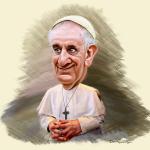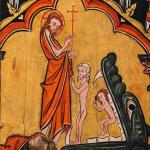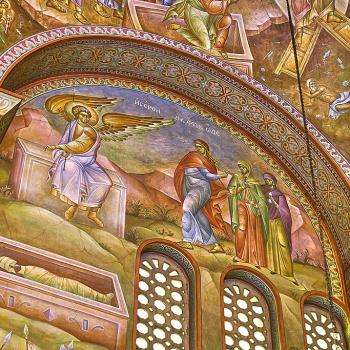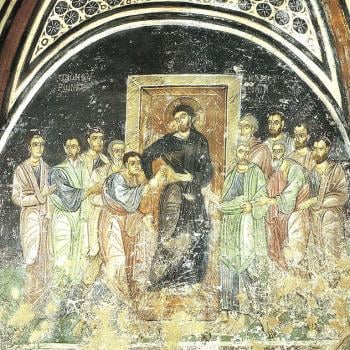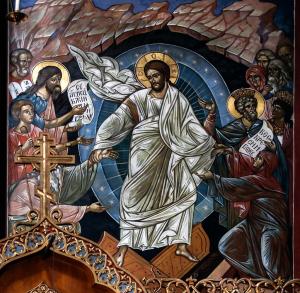
Jesus is the resurrection and the life: through him, the dead will come back to life. Death has been conquered by death, giving an end to death itself, which is why life after death will be eternal life. In his death, Jesus encountered all the dead so that he could taken them into himself and participate in his resurrection from the dead.
The key to eternal life is Jesus. The dead share in death together. Jesus, in his death, found himself one with the rest of the dead. He is the one who conquered death, but he conquered death from within, experiencing first the emptiness of death itself. He had to accept the weakness which leads to death in order make his way into the realm of death. That is, to be glorified, he first had to complete the kenotic act begun with the incarnation: he had to completely empty himself and assume not just humanity, but the death which humanity experienced, unto himself. In his resurrection, his solidarity with the dead allows all the dead to be taken in by him and participate in the resurrection for themselves. He is the hope of the dead, even as, in his temporal ministry, he gave hope to all who were willing to receive it from him:
But all of these <mysteries> are full of hope, and great discernment is hidden in them for those who fulfill them. How great is the power of faith and how exalted the knowledge of Christians and what intelligence they have of God! We believe in fact that the power of the mysteries of the Economy of the Only-Begotten is able to give absolution even to the dead, and even in Sheol to help those who believed in it during their lives. From this, those who concerning the resurrection hold that such hope is also for their deceased, have received instruction and with great faith make petition for this and ask absolution also for the dead. [1]
Jesus gives to the dead a transcendence over death. As Vladimir Solovyov pointed out to Fedorov, the goal is not just a simple return to the way things were before death, but a transformation where death and all that is connected with it no longer has any sway on us. The dead, when they are brought back to life in the eschatological resurrection, will be changed, even as Christ was changed in his resurrection from the dead:
The matter of resurrection, not only as a process but also according to the goal itself, is something conditional. Simple physical resurrection of the dead, in and of itself, cannot be the goal. Resurrecting people in a condition where they strive to devour one another, or resurrecting humanity at a degree of cannibalism, would be both impossible and completely undesirable. So, the goal is not simple resurrection of the personal composition of humanity, but restoration of it to a proper form; namely, in a condition such that all its parts and separate units do not exclude and not replace, but on the contrary, preserve and supplement one another. You are, of course, in perfect agreement with this: if the proper form of humanity (which it will be at the resurrection of the dead and the life of the age to come) is still only desired and not actual, it is in no way possible to reason about a proper image for actual humanity. [2]
Or, as St. John Chrysostom preached, while there might have been others who had died and come back to life only to die again, this is not what Christ’s resurrection offers to the dead:
Many dead men on occasion arose before Christ did. But no one ever arose as Christ did. For all the others who arose returned into the earth again. Even though they were freedom from the tyranny of death for a time, they were led back under its sway. But when the body of the Lord arose, it did not return into the earth again but went up to heaven and destroyed all the tyranny of the enemy. And, along with himself, Christ made the whole world arise and now he is seated on the royal throne.[3]
The way some of the dead were brought back to temporal life foreshadowed what was to happen with Christ’s resurrection from the dead. Each time someone was brought back to life, it was mere resuscitation, that is, they were given a mere temporal restoration to life. Nonetheless, these events can be said to point to and anticipate Christ’s eschatological resurrection from the dead because they pointed to the possibility of an ultimate triumph over death. Christ’s ascent to heaven after his resurrection showed us that his resurrection is what we were waiting for because he would not return to the grave. Jesus can and will take with him all those incorporated into him into his resurrection so that they will experience the eschatological glory presented by his ascension.
We tend to think of these truths in relation to humanity; in reality, his work is a cosmic work, and his conquest of death is shared with all creation. By becoming human he took up a created nature, assuming creation unto himself. Now, all of creation can be incorporated into him, drawing it all into eternity with him. Perhaps this is one way we can consider what happened to the food which he ate – he took that which was already dead, and by eating it, incorporated it into himself; having literally becoming a part of him, it can share in his resurrection from the dead. And as many like St. Albert the Great point out, we can see something similar going on with our eucharistic celebration, because, while we might receive Christ into us, we find Christ likewise receives us into himself:
For at first we do not know the Lord with the knowledge of approval and good pleasure, but then he makes us like himself as by digestion so that we may become worthy of his food, and so that it may benefit us when he changes us into himself by compunction and satisfaction. [Ps 102.26-27] [4]
Let us, therefore, appreciate what is symbolized in food. If we do so, we can appreciate the way we can all be seen as food for Christ. In communion, we are incorporated into the body of Christ. We go from spiritual death to participation in his eternal life. It should not be surprising, therefore, that Jesus, in his own mysterious way, is acting similarly to all that he received as food. He is not the bringer of death: he is the one who leads all the dead beyond death and into eternal life. His way is the way of life, and so we should try to discern how he brings life in each and everything he does.
[1] St. Isaac the Syrian, “The Third Part.” Trans. Mary T. Hansbury in An Anthology of Syriac Writers From Qatar in the Seventh Century. Ed. Mario Kozah, Abdulrahim Abu-Husayn, Saif Shaeen Al-Murikhi and Haya Al Thani (Piscataway, NJ: Gorgias Press, 2015), 393-4 [XI.19].
[2] Vladimir Soloviev, The Karamazov Correspondence. Letters of Vladimir S. Soloviev. Trans. and ed. Vladimir Wozniuk (Boston: Academic Studies Press, 2019), 51 [ Letter to Nikolai Fedorov, Jan 1882].
[3] St. John Chrysostom, On the Incomprehensible Nature of God. Trans. Paul W. Harkins (Washington, DC: CUA Press, 1982), 89 [Homily 2].
[4] St. Albert the Great, On the Body of the Lord. Trans. Sr. Albert Marie Surmanski, OP (Washington, DC: CUA Press, 2017), 143.
Stay in touch! Like A Little Bit of Nothing on Facebook.
If you liked what you read, please consider sharing it with your friends and family!
N.B.: While I read comments to moderate them, I rarely respond to them. If I don’t respond to your comment directly, don’t assume I am unthankful for it. I appreciate it. But I want readers to feel free to ask questions, and hopefully, dialogue with each other. I have shared what I wanted to say, though some responses will get a brief reply by me, or, if I find it interesting and something I can engage fully, as the foundation for another post. I have had many posts inspired or improved upon thanks to my readers.


